Smartphones in hand, society dials up the stupid
The hashtag ‘All Eyes on Rafah’ has trended around the world this week ... but the meme does not mean eyes on the Hamas terrorists hiding behind civilians there.
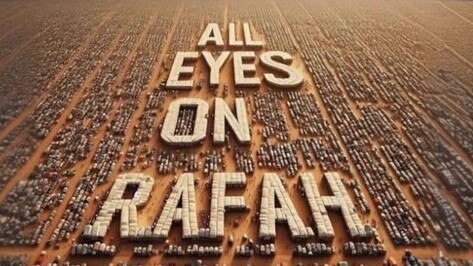
The great dumbing down will have been triggered by the arrival of the smartphone. Perversely, a device that has placed access to all the knowledge of human history into the palm of our hands will have reversed the trend.
Ignorance is all around us. From the pro-Hamas protesters on university campuses to the hysterical climate alarmists in the media, we are assailed by emotion and propaganda displacing reason and facts.
Yet there is no excuse for any ignorance any longer. With a smartphone in hand, we can sit on a park bench and summon the details or history of anything within seconds.
But most people choose not to, of course. Not when they have better options such as watching cat videos, posting selfies or checking out a TikTok craze.
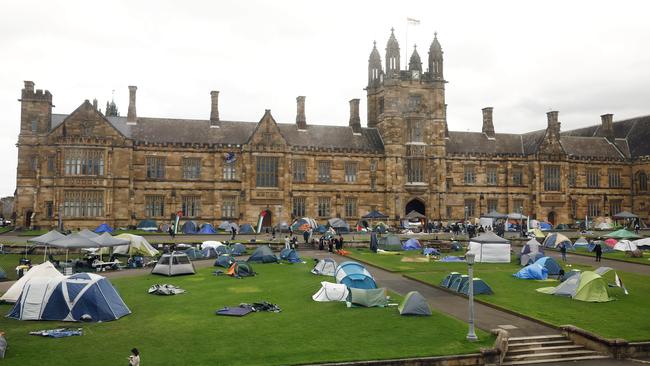
Social media is one of the top uses for smartphones, along with browsing the internet, making calls, capturing and sharing photos and videos, and listening to music and podcasts. We outsource our map-reading and navigation skills to Google Maps, and outsource our memory to contacts.
Smartphones often stand between us and normal human interactions. We have all seen those photos of people lucky enough to be at historic events, and most of them are watching it through a viewfinder as they capture it on video to post proof that they were there – if they watch through their phone what is the point of being there?
There are more than 20 million smartphones in Australia – more than 90 per cent of us have one. On average we use them for more than three hours a day, women use them more than men, and younger people more than their elders.
One in every four people is addicted to their phone. Arianna Lahiri is a 19-year-old Sydney university student who realised she was addicted and switched to a dumb phone last year.
“It was the doomscrolling on TikTok that really got me,” Lahiri told the ABC. “I would get stuck there and wouldn’t be able to feel time move around me. I realised this one night when I was going to go to bed – I said to myself, ‘Okay, 10 more minutes, then bedtime.’ It turned into three hours and I didn’t notice at all!”
The opportunity cost alone must be damaging our intelligence. All those hours that could be spent reading, exercising, socialising with actual human beings or on myriad other pursuits.
But then there is the content itself, bite-sized and superficial, with no curation or contestability. Social media is where bizarre conspiracy theories have equal billing with reasoned and factual analysis.
Our phones rob our brains of exercise. No need to remember numbers, no need to remember routes, no need to add or subtract because we all have a calculator in our pocket.
There was a time most of us would carry 100 or more phone numbers in our heads – friends, family, and work colleagues. As a young journalist I would write details into a contact book but be able to recall instantly numbers for dozens of politicians, business leaders, union figures and the like. Necessity was the mother of retention.
Little wonder we seem to be getting dumber. In Michigan in the US last month, 44-year-old Corey Harris demonstrated the benefits of smartphones when he appeared in his court case via Zoom while driving his car. The only problem was the hearing was about challenging his licence disqualification – the judge was staggered by what he saw and ordered Harris immediately into custody.
There is a deadly serious side to all of this. The superficiality of modern social media habits, the lack of a public square debate around agreed fundamental facts is damaging discourse and shaping political events.
Most young people do not read newspapers, they do not watch television news or listen to radio news. They get all their information via social media tidbits, much of it frivolous, lots of it misleading, even malicious, none of it substantive.
Alarmingly, social media algorithms ensure that bias and errors are compounded. As users click on one post with an alarming and possibly misleading angle, it means they will be targeted with similar posts, and soon enough prejudices are confirmed and entrenched, and without ever asking for it young people are shepherded into echo chambers without cross-checks or debate.
Yet right now these are some of the same people shaping the national and international debate on the complex issues around the Middle East. The pro-Palestinian, pro-Hamas and anti-Israel protests are promoted on social media and demonstrate social media-driven ignorance.
“It worries me that people get their understanding of history off social media without ever touching any of the real facts,” former Labor prime minister Julia Gillard said this week on the Sky News Never Again anti-Semitism documentary. “And because of that, I think particularly young people are developing views about this which are unbalanced and really not informed by the history in any way.”
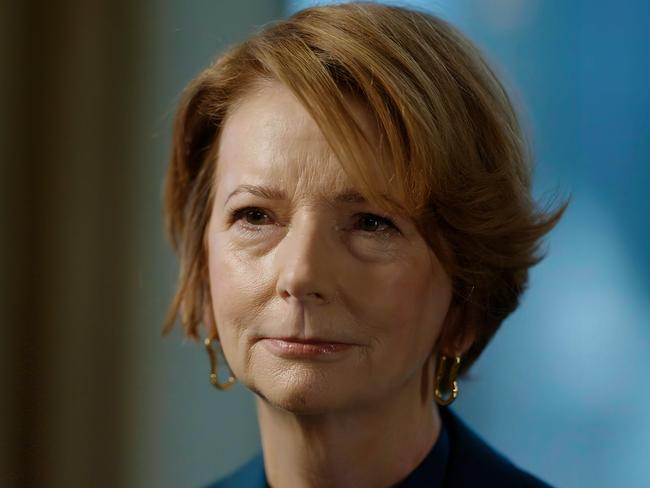
Venture on to Instagram and you can see a statement from 10 Australian university encampments: “We have established peaceful protest encampments on unceded Aboriginal land to stand with people of Gaza against the bombings, invasion and occupation by Israeli forces.”
There is so much that is ignorant and contradictory in that one opening sentence: they dub their action “peaceful” but they openly call for intifada (or the kind of armed insurrection that has previously deployed terrorism against Israel) and they promote the elimination of Israel and its people by chanting “from the river to the sea”; by their silly “unceded” logic their encampments are stealing Aboriginal land; and they talk about occupation by Israeli forces when Israel withdrew completely from Gaza in 2005, even uprooting its own settlers against their will.
None of these facts matters to the modern social media warriors. It is depressing enough that they ignore how the people of Gaza, who elected Hamas to lead them in 2007, have had almost two decades with tens of billions of dollars in aid to forge an independent future.
But most sickening is how the protesters simply ignore the way thousands of Hamas terrorists invaded southern Israel on a rape, torture, murder and kidnapping spree of unspeakable cruelty and barbarity on October 7 last year. That atrocity killed 1200, including elderly, men, women and children, with about a third of them being young people, much like the university protesters, at a music festival.
Of 250 hostages taken by Hamas more than 120 remain unaccounted for, held by Hamas in Gaza, yet the social media warriors at the university protests ignore them. The hostages, mothers and babies among them, are unremembered, deleted from the social media feeds, relegated to history by algorithms of self-selection.
It is morally repugnant and intellectually obscene. And it has real-world consequences, providing comfort and global encouragement to Hamas, thereby possibly prolonging war.
The hashtag “All Eyes on Rafah” has trended around the world this week but the meme does not mean eyes on the Hamas terrorists hiding behind civilians there, using them as human shields, nor does it direct eyes to hostages held and tortured there – no, the activists are interested only in the social media lie that Israel is deliberately killing civilians in Rafah. The university protesters have been praised on X for being “on the right side of history” by none other than Iran’s Supreme Leader Ali Khamenei, who funds Hamas and is committed to wiping Israel off the map. Say no more.
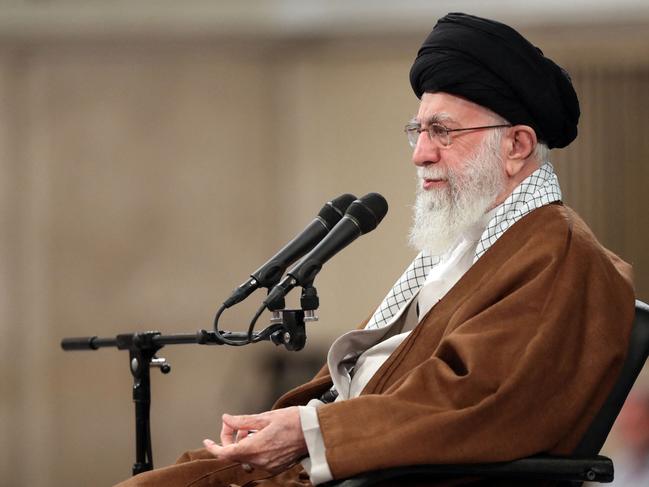
A post this week by Gina from the University of NSW student protest rattled off the usual lines about “genocide” with Macklemore’s anti-Israel anthem played in the background with its references to “white supremacy”. It matters little to these people that there are Israeli Jews of all skin colours living in a multi-ethnic, liberal democracy, with Arabs and Muslims among them.
Nor do the protesters think about the term genocide being applied to a Palestinian population that has grown exponentially over decades when it has been reliant on Israel for water, power and healthcare. Yet they support or ignore the actions of Hamas, an Islamist extremist terrorist organisation overtly committed to the elimination of Israel and genocide of Jews. Go figure.
American social psychologist Jonathan Haidt has been researching and writing on these trends for a decade or more; his latest book, The Anxious Generation, details how we are traumatising our children through social media. Previously he has written about how social media has created “structural stupidity” in society.
“A small number of young people are on social media not to make arguments, not to respond to arguments, but to destroy anyone who contradicts their sacred values,” Haidt says, “and that’s what makes the group stupid.”
The tendency for social media pile-ons ensures people do not challenge the zeitgeist or politically fashionable ideas, they self-censor in the face of extremists, so debate suffers and we end up with structural stupidity. We have seen this play out in the climate change debate. Just consider Greta Thunberg’s fame and influence and ask yourself whether she has ever made a factual or rational intervention or contributed to an enlightened debate. Fact-free emotionalism rules.
This is not about blaming the young; the same process plays out with older opinionistas. On the ABC’s Media Watch program this week Paul Barry tried to suggest that nuclear energy was inadequate for this country because we needed climate action before it could be built.
To suggest the climate will behave differently depending on whether Australia reaches net zero in 2040, 2050 or 2080 is the height of ignorance, We are 1 per cent of global emissions, with our output falling while globally emissions rise, and it is plainly scientific nonsense to pretend our nuclear program, much less the timing of it, will impact the climate.
This brings me to the mainstream media, which is too often part of the same problem. As I have just noted with Barry, social media emotionalism and ignorance are picked up or amplified on traditional media.
Social media outrage provides easy stories and clickbait, which means the extreme views of a minority online are often amplified by other media, creating a perpetual feedback loop. Structural stupidity indeed.
There is much to be worried about in public debate – polarisation and dumbing down aided by these incredible devices we all carry. But just one word of caution; the way to deal with these challenges is not to hand governments more power to censor content. The government’s so-called misinformation bill needs to be resisted. Canberra secretly censored digital information during Covid, and much of what it banned was true.
Government censorship will accelerate the great dumbing down, not arrest it.
Better to ban the devices rather than the content, starting with keeping them out of all schools.




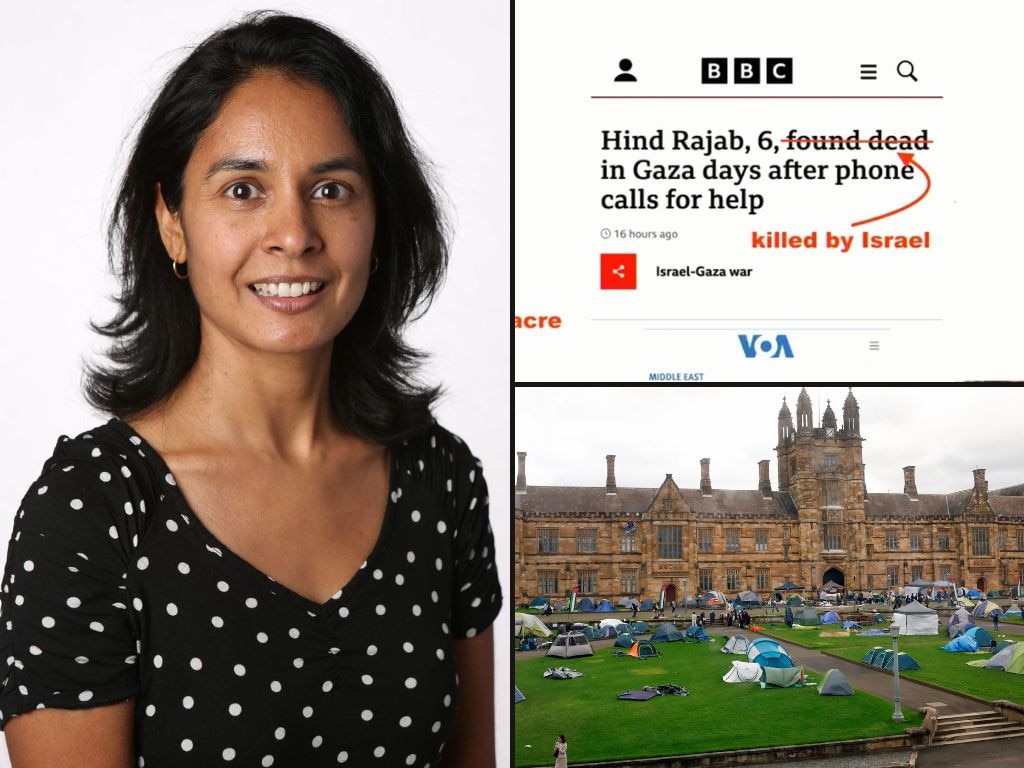
Surrounded as we are by social media memes, “influencers” and idiocy, it worries me that in years to come scientific studies will conclude that peak human evolution is behind us. They will find a way to chart the relentless rise of average human intelligence across millennia and then they will deduce that it peaked in the past decade before it began to fall in recent years.